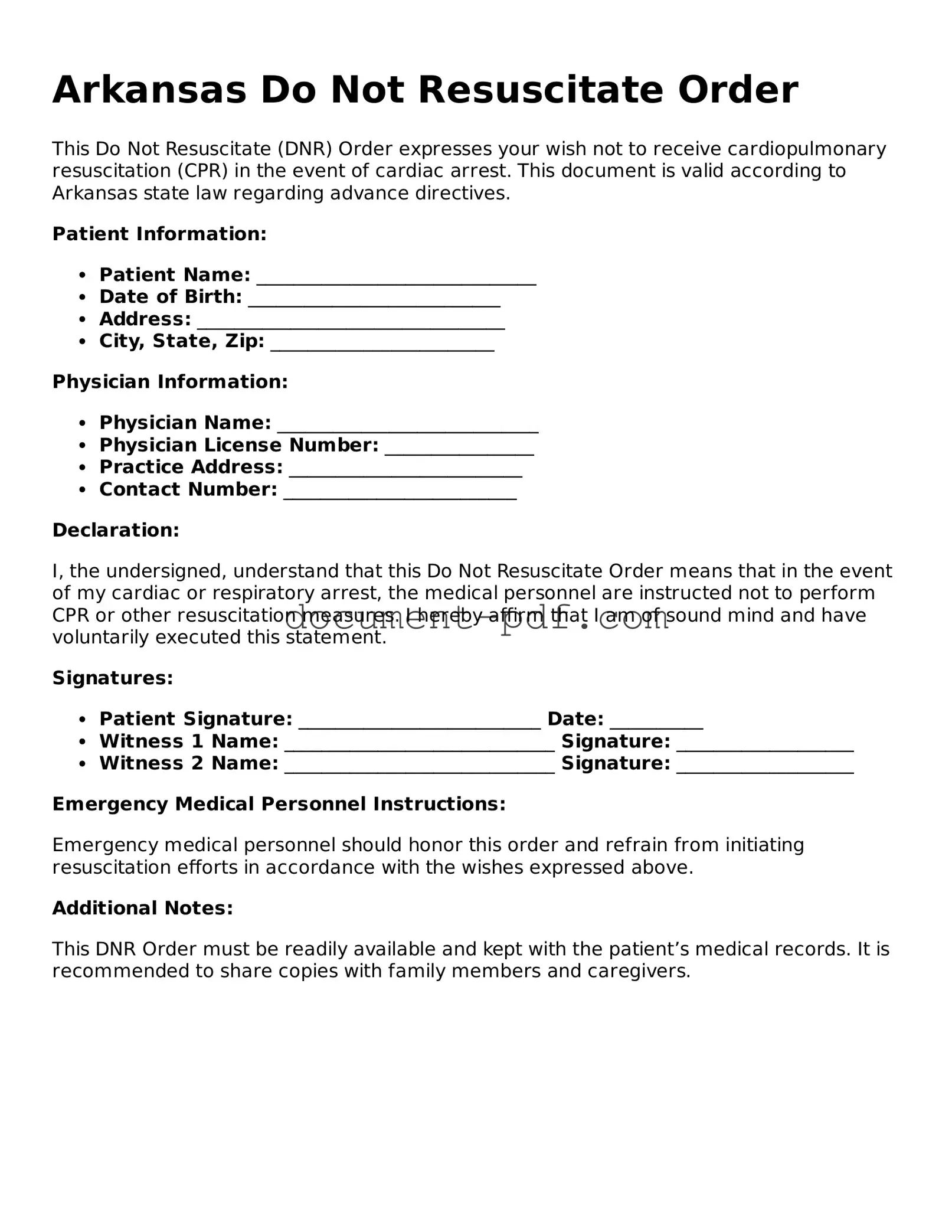The Arkansas Do Not Resuscitate (DNR) Order form shares similarities with the Advance Healthcare Directive. An Advance Healthcare Directive allows individuals to outline their medical treatment preferences in case they become unable to communicate their wishes. Like the DNR, this document can specify the types of medical interventions a person does or does not want, ensuring that their choices are respected during critical health situations.
Another document akin to the DNR is the Living Will. A Living Will provides guidance on a person’s wishes regarding life-sustaining treatments in the event of terminal illness or irreversible conditions. Similar to the DNR, it serves to communicate the individual’s preferences to healthcare providers, thereby reducing confusion and ensuring that their end-of-life wishes are honored.
The Medical Power of Attorney is also comparable to the DNR Order. This document allows an individual to designate someone else to make healthcare decisions on their behalf if they are unable to do so. While the DNR focuses specifically on resuscitation efforts, the Medical Power of Attorney encompasses a broader range of healthcare decisions, ensuring that the appointed agent can advocate for the individual’s overall health care preferences.
Another relevant document is the Physician Orders for Life-Sustaining Treatment (POLST). The POLST form is designed for individuals with serious health conditions who want to specify their preferences for treatments, including resuscitation. Like the DNR, it provides clear instructions to medical personnel, but it also addresses other medical interventions, making it a comprehensive tool for end-of-life care.
The Do Not Intubate (DNI) Order is similar to the DNR in that both documents address specific medical interventions. A DNI specifically instructs healthcare providers not to insert a breathing tube in the event of respiratory failure. While the DNR focuses on resuscitation, the DNI targets a particular aspect of life support, ensuring that the patient’s wishes regarding breathing assistance are respected.
The Arkansas Do Not Resuscitate (DNR) Order form closely resembles an Advance Healthcare Directive. Both documents allow individuals to express their medical preferences regarding life-sustaining treatments. An Advance Healthcare Directive can cover a wider range of healthcare decisions, such as which medical treatments one would want or refuse, and it typically designates a healthcare proxy. Additionally, it is important to be aware of resources that can aid in understanding such documents, including Texas PDF Templates, which provide various forms and templates relevant to tenant and landlord communications.
The Comfort Care Order is another document that aligns with the DNR. This order emphasizes the importance of providing comfort and palliative care rather than aggressive life-saving measures. It is similar to the DNR in that it prioritizes the patient’s quality of life and aligns medical care with their values and preferences, especially in terminal situations.
The Healthcare Proxy is also related to the DNR. This document allows individuals to appoint someone to make medical decisions on their behalf. While it does not specifically address resuscitation, it empowers the designated proxy to make choices that reflect the individual’s wishes, including decisions about DNR orders and other life-sustaining treatments.
Lastly, the Do Not Hospitalize (DNH) Order is comparable to the DNR form. A DNH order indicates a patient’s preference to avoid hospitalization in certain situations, focusing on comfort and quality of life. Like the DNR, it reflects the individual’s desires regarding medical interventions, ensuring that their preferences are clear to healthcare providers, especially in emergency situations.

